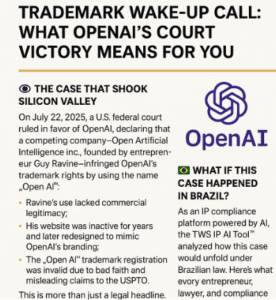
By Marcus Julius Zanon
IP Attorney & Compliance Officer
Powered by TWS IP AI Tool – Your Shield in the Age of Artificial Intelligence
On July 22, 2025, a U.S. federal court ruled in favor of OpenAI, declaring that a competing company—Open Artificial Intelligence Inc., founded by entrepreneur Guy Ravine—infringed OpenAI’s trademark rights by using the name “Open AI”.
Despite owning the domain open.ai months before OpenAI was founded, the court concluded that:
Ravine’s use lacked commercial legitimacy;
His website was inactive for years and later redesigned to mimic OpenAI’s branding;
The “Open AI” trademark registration was invalid due to bad faith and misleading claims to the USPTO.
This is more than just a legal headline. It’s a strategic warning to innovators, founders, and legal teams worldwide.
As an IP compliance platform powered by AI, the TWS IP AI Tool analyzed how this case would unfold under Brazilian law. Here’s what every entrepreneur, lawyer, and compliance officer should understand:
| Key Legal Factor | What U.S. Court Found | Brazilian Law Analysis |
|---|---|---|
| Domain ownership | Does not create trademark rights | Same in Brazil. NIC.br governs domains, but only INPI registration creates enforceable TM rights |
| Trademark registration | Ravine applied post-launch of OpenAI | Brazil: First to file wins – Art. 129 LPI |
| Use in commerce | Use must be proven to sustain TM rights | Use is not required to file, but non-use for 5 years = cancellation (caducidade) |
| Bad faith & deception | Site mimicked OpenAI to confuse users | Violation of Art. 124, XIX + Art. 195 (Unfair Competition) |
| Judicial relief | Injunction granted, trademark cancelled | Tutela antecipada + nullity action available in Brazil under CPC + LPI |
This ruling sends a loud message:
⚠️ If you’re launching a brand in AI, tech, health, or finance and not registering your trademarks early, you are exposed.
⚠️ If you’re using a domain without valid INPI registration and think you’re safe—you’re not.
⚠️ If your website or brand identity mimics that of a market leader—you risk not just loss of rights, but liability for unfair competition.
✅ Real-time trademark conflict detection using AI-based similarity models
✅ Weekly INPI Gazette monitoring (RPI) for alerts and brand surveillance
✅ Automated draft of oppositions and nullity actions
✅ Compliance mapping under Brazilian LPI and Consumer Law (CDC)
✅ Domain vs. Trademark watchlists to avoid “OpenAI-style” pitfalls
✅ Strategic insights on bad faith filings, caducidade risk, and unfair competition
Register your trademarks before announcing your launch. Domain ownership ≠ legal protection.
Even visual similarities in logos, colors, or layout can trigger liability. Use the TWS IP AI Tool’s visual similarity scanner to check.
Use automated RPI monitoring to spot rising conflicts, third-party filings, and non-use risks in real-time.
If you’ve registered but are not actively using your brand, your rights may be lost through caducidade.
If this case teaches us anything, it’s this:
Compliance and IP strategy must begin before code is written, before product is shipped, and before launch day.
Waiting until conflict emerges is too late.
Use our services today to:
✅ Run a conflict check
✅ Monitor weekly Gazettes (RPI)
✅ Draft preventive oppositions
✅ Validate your current TM portfolio
Schedule a free strategic session now
TWS IP AI Tool™
Proactive Protection. Strategic Intelligence. Built for the IP Landscape of Tomorrow.